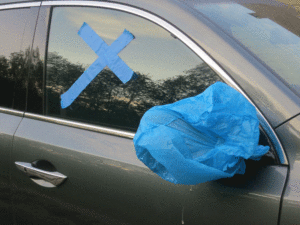
When employees defend their territory — unnecessarily

This is our attempt to dissuade the bird from seeing his reflection, thereby eliminating his need to be unnecessarily territorial. It has helped, but not cured the situation. Even though you may solve every issue, it’s still important to do what you can to help your fellow employees feel supported. Offer understanding and drop the judgment whenever you can; this helps create a culture where an individual has less need to be protective of things that aren’t in jeopardy anyhow.
Organizations can be a breeding ground for territorial disputes. We’ve all witnessed when a co-worker is intent on protecting something they feel close to, whether it be an idea they have, a task that don’t want to let go of, or an ego that is bruised. It’s easier for a third-party to see when someone is unnecessarily defending his territory, and difficult for the individual to recognize how silly it looks. Take, for example, the bird in our driveway, along with my own example from a personal story that came to light this week.
First, the bird story. For the last three years, we’ve had a small yellow song bird create quite a fuss on our cars during this spring breeding season. The first time he appeared in 2014, we had no idea what was going on. After researching more about it, we realized this bird was reacting to his reflection in our side-view mirrors; he thought it was another bird competing for females in the vicinity. In order to defend his territory, he squawks, flaps his wings excessively, and leaves poop all over our cars (yes, disgusting!). It’s quite easy for us to see how crazy and unproductive this behavior is. But to this bird, it’s serious and critical for his survival, yet he is expending a lot of energy that would be better spent hunting for food or finding a mate. [youtube]https://youtu.be/ZkLuxDhEYo8[/youtube]
Birds aren’t the only ones susceptible to strutting unnecessarily. It can happen to any of us; I can attest to that! Just a few days ago, in conversation with a trusted colleague, she had reason to gently remind me of a comment I made to her about 10 years ago. At that time, I was relatively new in my own business and she was starting out as a consultant. Instead of offering a collaborative approach, my comment basically warned her to not to intrude on the assessment business in NH! Now I see how ridiculous that was. There is so much work out there and I now fully recognize and appreciate the value of opening up instead of walling off options. I am so grateful that Renee Charney moved past that idiotic comment I made to her and we’ve enjoyed a warm friendship since then, a testament to her character. While embarrassed at having that memory recounted, it is an excellent reminder of how easy it is to fall victim to protecting something that you don’t even need to protect.
When an employee feels a need to defend her position, it can look like this:
- boasting a bit too much about an idea they have, while also bashing the idea and work of someone else
- not taking responsibility for a mistake that was made
- pushing the blame of an issue onto someone else
- any behavior that is intended to protect a personal view without recognition of another’s perspective or the bigger picture
What can you do? Here are some ideas to help you work through these situations.
- Remember that the motivation behind the unsavory behavior is likely innocent. Think about the bird!
- Suspend the judgment and move on. How lucky for me that Renee chose that route.
- Provide support and encouragement that will help reduce a person’s need to be territorial.
- Create a culture where risk-taking is encouraged and not penalized. You must show through actions, not just words, that people are safe.
It’s a natural reaction to want to protect our turf, though almost always, it’s unnecessary. Any ideas on how I can get our bird to see that?

